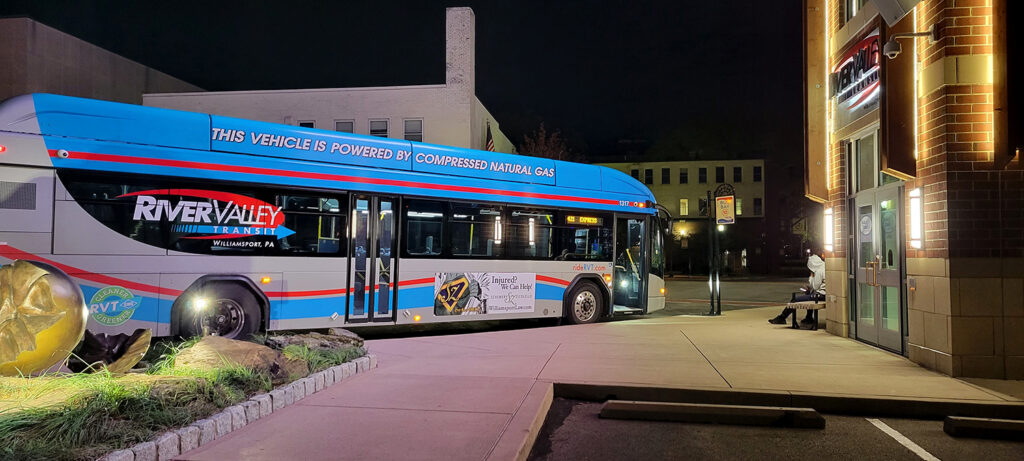
WILLIAMSPORT – Systems of checks and balances meant to ensure accountability within city government have failed for years, according to an independent audit released Thursday.
The audit, administered by RKL, an auditing and accounting firm in Pennsylvania, investigated River Valley Transit’s 2019 to 2020 finances and discovered an ongoing pattern of misappropriation of funds, misuse of state and federal grant monies and a failure to meet local match requirements for various grants.
The inconsistencies rise to the level of fraud, according to Mark Zettlemoyer, one of the audit administrators.
“We were unable to satisfy ourselves that the financial statements are free from material misstatements,” according to the audit.
River Valley Transit is funded primarily through federal, state and local grant dollars. The audit indicates that state and federal grant funds meant to only be used for transit purposes have been used to fund Williamsport capital projects, such as local economic development projects and street construction.
The transit authority also holds a debt of nearly $11 million, according to RKL.
“Debt for a transit authority is very, very unusual,” Zettlemoyer said. “An organization that is the size of RVT having almost $11 million dollars of debt is highly unusual from that standpoint.”
The result of the audit could mean the city will be required to repay the misused funds to the state Department of Transportation and the Federal Transit Authority, which provides funds for the bulk of River Valley Transit’s annual budget. It’s unclear how much the city will need to pay, according to Mayor Derek Slaughter.
The audit findings help to shed light on the nature of an ongoing state Attorney General investigation into misappropriation of funds within Williamsport’s government. It’s also evident that the financial inconsistencies are not limited to 2019 and 2020 but have been a pattern of behavior for some time, according to RKL.
The release of the audit’s findings left members of city council, some who have been council members for many years, asking how the city could fall out of compliance so drastically.
City administrators, annual audits, city council oversight, as well as the city controller and treasurer all serve as independent critics of city transactions, however these misappropriations seemingly went unnoticed for years.
Previous audits
City Council was presented with the audit during its Thursday evening meeting. Councilwoman Bonnie Katz, who also serves on the city Finance Committee, said this is the first River Valley Transit audit she has seen presented to council.
Slaughter, who served on council for two years before becoming mayor in 2020, agreed that RVT audits were not brought before council.
“I don’t believe we saw an audit for RVT, but I know we saw city audits,” Slaughter said.
The primary auditor for Williamsport has been Baker Tilly, a national auditing firm with its Williamsport location in Water Tower Square. The firm abruptly terminated its contract with the city in May 2021, leaving that year’s audit unfinished.
RKL was hired by the city to finish the previous year’s audit and identify irregularities in the transit system’s finances, which were already suspected.
City Controller Margaret “Peg” Woodring, who oversees audits of the city, said she was surprised by Baker Tilly’s sudden disengagement from the city, and said she had no knowledge of misappropriation of funds within the city.
“There are always rumors, but you can’t put much stock in those until you see the facts,” Woodring said. “I had heard that there was something going on with RVT with the audit. I never really knew exactly what the monies were… until I heard the audit.”
Commingled bank accounts
While River Valley Transit’s annual budget of over $6 million makes up nearly a quarter of the city’s overall budget, the transit bureau was not considered to be its own department within the city until just recently, according to Councilman Adam Yoder.
In addition, the transit funds were not placed into separate bank accounts, which is required by the state. These funds were placed into a bulk general account commingled with city funds. This makes it impossible to determine which money in the city ledger is approved for general expenses and which are previously designated grant dollars.
Zettlemoyer outlined instances where transit grant funds were used to pay for city projects and then used to “pay for the debt service incurred by these projects.”
“Some of this debt is between entities as well. Related to the Williamsport Parking Authority,” Zettlemoyer said, “we were unable to reconcile what was paid out by RVT for debt service and then what was paid out in transfer by the Williamsport Parking Authority.”
Zettlemoyer went on to add that the transit center was not providing appropriate local match funds from area municipalities or entities as a requirement for its various grants. These local match funds are required to be provided to RVT with no expectation of service in return; however, according to Zettlemoyer, this was not always the case.
In addition, some municipalities, from which RVT recorded receiving funds, were never billed for the match funds and subsequently did not factor them into their own annual budgets.
Isolated power
Speculation has mounted over the past two years about the actions of former city Finance Director William E. Nichols Jr. in misappropriation of funds within the city. Nichols also was director of River Valley Transit.
During over 40 years with the city, he was heralded for his ability to find grant money for local projects and is credited with the success of many building projects and developments within the city.
In January 2020, Nichols was terminated from his employment with the city by newly elected Slaughter, who ran for office on a platform of fiscal transparency, stating publicly that during his time on City Council he found inconsistencies within the city and RVT budgets.
Since then, Attorney General Josh Shapiro has opened an investigation into Williamsport, which is ongoing.
Nichols did not response to requests for comment.
Without naming Nichols directly, Councilwoman Liz Miele, stressed the importance of separation of powers during the Tuesday financial committee meeting.
“In previous administrations, we’ve seen just a handful of individuals occupying too many roles that give them too much power,” she said, adding that, moving forward, RVT should be separated from city business as much as possible so the city is not compromised again.
“If we get the wrong person in the position … if we don’t have enough separation of powers, this can all happen again,” she said.
Future checks and balances
Beginning in 2020, the city’s entire financial structure has been overhauled, according to Slaughter.
Separate bank accounts have been created for River Valley Transit and financial systems and processes have been adjusted to meet state requirements.
The director of finance position remains vacant, as it has been separated from the River Valley Transit manager position and now will need additional payroll funds to fill it.
According to Slaughter, it is still unclear what money in the city’s general fund is PennDOT grant funds and which can be used for general city business. Zettlemoyer said PennDOT could call those funds back at any time; therefore, it is still unclear what the city’s financial position is.
“We need to enact some procedures and policies to fix this,” Yoder said, adding that while the city was in compliance at one point, somehow it got out of compliance and increased oversight from City Council should be put in place moving forward.
During Thursday night’s council meeting, Yoder said he would be presenting legislation before council to institute an oversight committee for the transit system.
Woodring told On the PULSE Friday that she is happy with the improvements that were made over the past year.
“I feel that they have put in quite a few solutions to the problems that hopefully will correct all the financials so far,” Woodring said.
An additional audit into city finances is underway, which, coupled with the attorney general investigation, could bring to light even more financial missteps within city government, Slaughter said.
Yoder added that the power to fix the issue lies with everyone in the city government.
“The burden of responsibility falls on all leadership in the city,” Yoder said. “It is going to take all of us to implement corrective measures and solutions to come out of this.”




